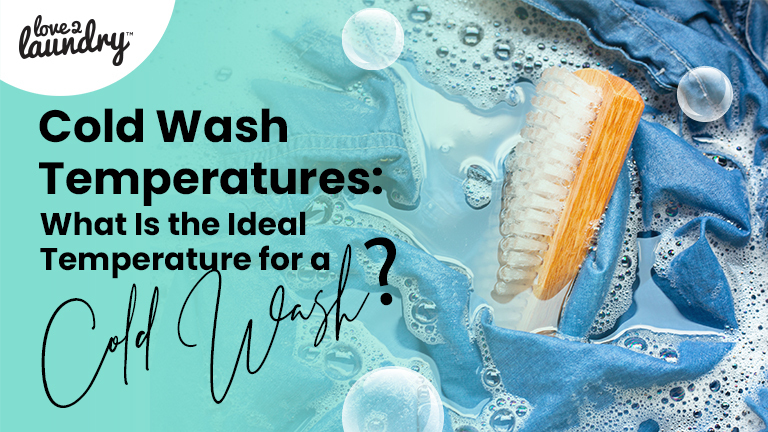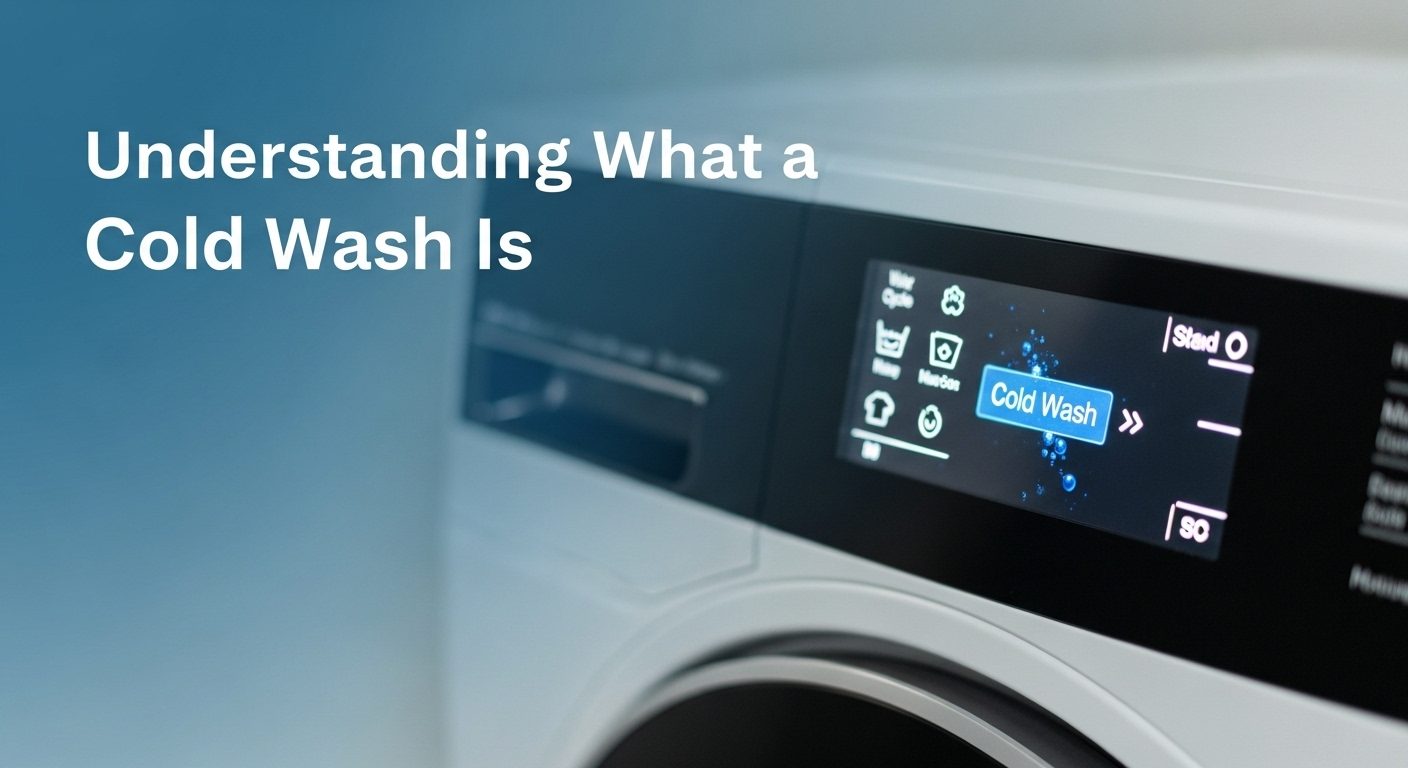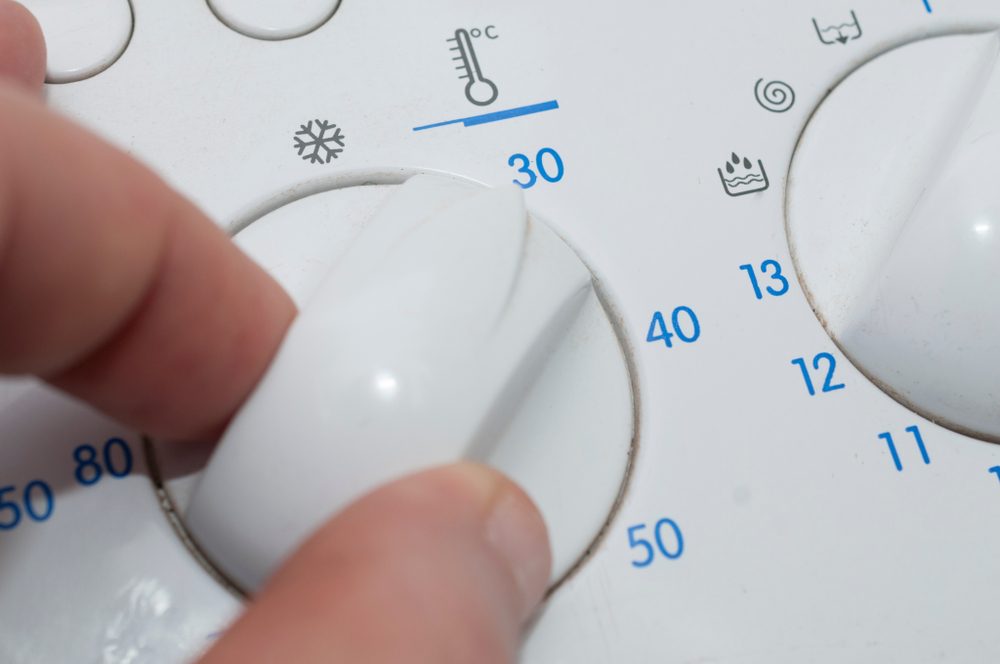
Cold Wash Temperatures: What Is the Ideal Temperature for a Cold Wash
Using cold water to wash delicate fabrics is suitable for preventing damage while removing stains, but understanding what temp is cold wash becomes necessary to achieve that near-ideal temperature. This knowledge is crucial for machine washing. You will see these cold wash temperature ranges in the washing machine temperature guide.
Therefore, it’s advisable to maintain a temperature of under 30 ℃. Washing at the wrong temperature could ruin the outfit by shrinking and fading. Many people are unsure about the temperatures, i.e., is 30 degrees a cold wash or is 20 degrees a cold wash, or even what temperature is cold wash. If that is the case with you, please seek the guidance of an expert like Love2Laundry for cold wash temperatures.
We provide top-quality laundry service to wash clothes without causing damage. Our technique inspects the fabric to determine whether to use a warm or cold wash temperature. You can trust us to handle your laundry and keep your routine stress-free.
Here is some laundry knowledge on what temperature is cold wash when gearing to use a washing machine for cleaning delicate fabrics properly. Achieving that ideal cold wash temperature will remove stains effectively and make your outfits fresh and durable.

Here are some tips that’ll guide you about what temp is cold wash, along with the best temp for washing whites properly.
Why Cold Wash Temperature Matters for Your Laundry?
When you think about doing laundry, you might assume hot water cleans better. But that’s not always true. In fact, knowing what temperature is cold wash, usually around 20 to 30°C (68–86°F), is often the smarter choice for most clothes. It gets the job done and comes with a bunch of benefits that make laundry easier on your clothes, your wallet, and the environment.
Cold wash temperatures are suitable for eco-friendly washing because they prevent residues from damaging the environment. Let’s check out the benefits of cold washing.
Let’s break it down in simple terms:

Benefits of Cold Wash for Your Clothes
1. It’s Gentler on Clothes
Hot water can be tough on fabrics. It may cause shrinking, colour fading, or even damage delicate items like lace or stretchy sportswear. Cold water, on the other hand, keeps your clothes in good shape for longer. It’s perfect for everyday items and gentle on those special pieces you don’t want to ruin.
2. Helps Colours Stay Bright
Have you ever washed a bright shirt only to find the colour looking dull or faded? Hot water is often the culprit. Cold water helps lock in colour and prevents bleeding. It is possible because dyes are stronger than dirt and stain, and cold water works on them first, especially with dark or vibrant clothes. Warm or hot water can make an impact on colours, too.
3. Saves You Money on Energy Bills
Your washing machine uses most of its energy just to heat up the water. By washing in cold water, you’re using a lot less energy, meaning lower electricity bills for you.
4. Better for the Environment
Less energy used = fewer carbon emissions. Choosing cold washes is a small change that adds up, helping reduce your impact on the planet with every load.
5. Still Gets Clothes Clean
Thanks to modern detergents made for cold water, you don’t need high heat to fight dirt or stains. These specially-formulated soaps work just as well, even in cooler temperatures.
So, is 20 degrees a cold wash and should you go for it? Definitely, cold washing is a win for your clothes, your budget, and the environment. It’s a simple switch that makes a big difference without sacrificing clean laundry.
What Temperature Is Cold Wash?
You’ll find people asking what temperature is cold wash or what temperature to wash white clothes in the UK. People want to protect their outfits from damage, so they keep wondering, is 20 degrees a cold wash or is 30 degrees a cold wash? We have even seen queries about ‘Is 40 degrees a cold wash?’
The answer depends on the fabric type, detergent used, and the type of stains you’re dealing with. Most modern washing machines allow you to choose specific temperatures, but it can be confusing when you’re trying to decide:
Is 20 degrees a cold wash? Is 30 degrees a cold wash? What about 40 degrees?
Let’s break it down by temperature range to help you make the right choice:
Is 20 Degrees a Cold Wash?
Yes, 20°C is considered a cold wash, especially in modern machines that are designed to clean well even at low temperatures.
Why it matters
Washing at 20°C is great for lightly soiled clothes or delicate fabrics like silk, lace, and activewear. It’s also the most energy-efficient option. Why? Because it uses the least amount of electricity and keeps your utility bills lower.
Best for:
- Delicates
- Light Everyday Wear
- Quick Freshening Up
- Eco-Conscious Laundry Habits
Is 30 Degrees a Cold Wash?
30°C is also considered a cold wash, but it offers a bit more cleaning power than 20°C, making it ideal for clothes that need a little extra freshening up.
Why it matters
This temperature is gentle on fabrics while still being effective against light stains or dirt. It’s a perfect balance between fabric care and decent cleaning performance. Plus, most cold-water detergents are tested to perform well at this temperature.
Best for:
- Synthetic Fabrics
- Bright Colours
- Lightly Stained Garments
- Everyday Washing
Is 40 Degrees a Cold Wash?
Technically, 40°C is the start of a warm wash, not cold. However, it’s still on the lower end of the temperature scale and commonly used for more thorough cleaning without harsh heat.
Why it matters
At 40°C, you’ll get better results on moderately dirty clothes without using hot water. It’s also a safe temperature for cotton, linens, and white garments that don’t require boiling but need a proper clean. This also answers your question of ‘what temperature to wash whites?’
Best for:
- Towels and Bed Linens
- White Clothes (non-delicate)
- Everyday Cotton Items
- Heavier fabrics Needing Freshness
Final Tip: Always Check the Care Label
Before choosing any temperature, take a quick look at the care label. It will tell you the maximum safe temperature for washing your clothes. If you’re ever unsure, sticking to 30°C is usually a safe and smart middle ground.
When Should You Choose a Cold Wash?
You’ll find multiple reasons for choosing a cold wash instead of a regular one, depending on the stain, fabric type, and colour. Lightly soiled outfits that could sustain damage from regular washing also require cold temperatures.
Here are some other scenarios to dig deeper into cold washing.
Fabrics Best Suited for Cold Washing
The first reason to choose cold wash is that it is suitable for fabrics such as silk, wool, and spandex. The fibres of such fabrics are soft and can sustain damage in warm washing. A washing machine at cold temperatures washes your outfits and effectively removes stains.
Exceptional Cases: Cold Wash for Stains
In special cases where the stain on your clothes is particularly thick, such as blood or sweat, cold washing can often do the trick. Blood and sweat are protein-based stains, and hot water can set them, making them harder to remove. That’s because cold water goes into the fibres easily and removes tough stains. Experts recommend a temperature of 20℃ to 30℃ as the best temp to wash clothes with stubborn stains.
What Are the Limitations of Cold Washing?
There are some limitations you should remember when cold washing, as it could ruin your clothes. Instead of removing the stains and odours, it could damage your outfits by spreading the stain. In case you dont know what temperature cold wash limitations are, here are some to look at.
Cold Washing Could Be Ineffective on Stubborn Stains
Cold water works well for light dirt and fresh stains, but deep-set or greasy stains (like oil, wine, or makeup) may need warmer water or pre-treatment to lift completely. For tough messes, pre-soaking or using a stain remover is often necessary.
Cold Water Doesn’t Sanitise
Washing at 20–30°C won’t kill bacteria or viruses. If you’re cleaning towels, underwear, baby clothes, or garments worn during illness, it’s safer to use a warm or hot cycle (above 60°C) to ensure proper sanitisation. So, if you’re thinking is 40°C a cold wash that sanitises clothes, the answer is no.
Cold Washing May Extend the Cycle Time
To make up for the lower temperature, some machines take longer to agitate or rinse during cold washes. This means the total cycle time may be slightly longer than a warm or hot wash, depending on your machine.
Cold Water Might Not Dissolve Detergent Completely
Some powder detergents or cheap liquid soaps don’t dissolve as well in cold water. This can leave residue on clothes, especially in shorter cycles. For best results, always use detergents labelled for cold wash or switch to high-efficiency liquid options.
Cold Wash vs. Warmer Temperatures
The question of what temp is cold wash often leads to the comparison between hot and cold wash temperatures in the laundry department. The difference between washing fabrics at cold and hot temperatures is that cold wash temperatures are suitable for delicate fabrics with stubborn stains. In contrast, hot wash temperatures are recommended for durable outfits. A comparison of the two would highlight their benefits perfectly.
Benefits of Cold Washing
Here are some of the benefits of cold washing:
- Preservation of the fabrics.
- Reduced energy consumption.
- Eco-friendly options.
- Prevents the shrinkage of clothes.
Benefits of Hot Washing
Now, let’s look at the benefits of hot washing to keep your clothes durable.
- Removes bacteria and allergens.
- Prevents the odour buildup.
- Suits on heavily soiled outfits.
- Enhances the white-coloured fabrics.
Tips for Effective Cold Washing
Cold washing could be enhanced if you opt for some tips to be used during the washing procedure. If you know what temperature is cold wash temp and want to improve its effectiveness, here are some tips to do it.
- Opt for cold water or wash detergent.
- Pretreat the stains with cold water.
- Sort outfits by colour and fabric type.
- Set your washing machine on a gentle cycle.
Pre-Treatment for Best Results
Pretreating delicate fabrics with cold water lowers the density of stubborn stains and assists you during washing. You can start the procedure by:
- Filling your basin with cold water.
- Adding a stain remover.
- Submerging your clothes in the solution.
- Rinsing the fabric with cold water.
Using the Right Detergent
A laundry detergent suitable for cold washing and delicate fabrics effectively removes stains from fabric fibres. It penetrates the fibres and eliminates odours without damaging your outfit.
Choose Love2Laundry for Your Cold Wash Needs
If you don’t have the time or brain to go into the debate and find out what temperature is cold wash, then choose a professional laundry service that knows this already, along with many other techniques of cleaning garments.
The reason for choosing Love2Laundry for cold or any other washing needs is the expert handling of fabrics. Our technique for pretreating and washing outfits effectively removes stains without causing shrinkage or fading. With 24-hour free pickup and delivery service, we offer flexibility and convenience to keep your routine hurdle-free.
Our Wash and Fold Laundry Service
We offer high-quality wash and fold services to remove stubborn odours and free your busy schedule from hurdles. Our eco-friendly washing procedure washes your outfits without harming your clothes.
You can schedule our online laundry services using the best laundry app (iOS | Android), and let us look after your clothes at cold wash temperatures. Please have a look at our pricing to know how reasonable it is to relieve yourself from the nuances of what temperature is cold wash.
FAQs – The Perfect Temperature for a Cold Wash
Is 30C a cold wash?
Is 30 degrees a cold wash? Yes, and it is perfect for delicate fabrics and soiled garments. It protects clothes from shrinking and colours that could fade away easily.
Should I wash at 30 °C or 40 °C?
Washing your clothes at 30℃ to 40℃ depends on the condition of your outfits. Fabrics like wool and silk are suitable to wash at 30℃, while cotton & linens could be washed at 40℃.
Can I wash everything in cold water?
Using cold water for washing is suitable for most fabrics, like delicate ones, which are exposed to shrinking and fading. However, durable fabrics can be washed in cold water but they are not effectively cleaned compared to hot water.
Should bed sheets be washed cold or hot?
Bed sheets with delicate fabrics should be washed with cold water at 30℃. Regular and heavily soiled bed sheets should be washed at 40℃.
Why are my clothes shrinking in cold water?
There could be multiple factors that cause clothes to shrink in cold water, like incorrect drying process, agitation, and fabric type. Outfits like cotton and wool would shrink in cold water.
Wrap Up!
Now that you know what temperature is cold wash, you can make smarter choices for your laundry. Cold water is great for protecting delicate fabrics from shrinking, fading, or wearing out too quickly.
But keep in mind, not all clothes are made equal. If you’re dealing with heavily soiled items like dirty cotton shirts, towels, or wool sweaters, a warm wash might be the better choice. Warm water helps break down dirt, remove tough stains, and kill germs and bacteria more effectively.
In summary, wash everyday clothes and delicate items with cold water (20–30°C) to save energy, and opt for warm water (40°C and above) for thorough cleaning when hygiene is paramount.f



